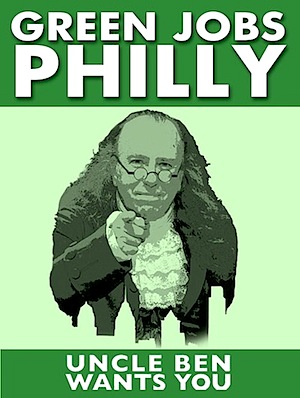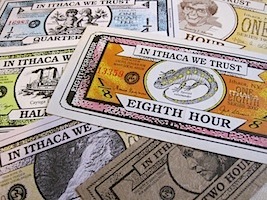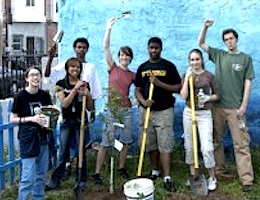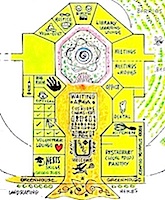|
Philly's Choice
by Paul Glover
* Grid magazine * September 2008
Philadelphia is ready to become one of the most beautiful and enjoyable
cities in America. It's fully capable of being a model green
city. Our city is also ready to become hell on earth, due to
rocketing fuel and food prices.
We're being forced to think outside the box because, with the collapse
of fossil fuel, there will be no box to think inside. Since
normalcy is no longer practical we'll choose either to rebuild this
city or be bystanders at its decline. Within thirty years
Philadelphia will be either a green city or a ghost town.
So let's imagine a Philadelphia that works well with one tenth the oil
and natural gas. Prepare to laugh at some of these
suggestions. Then prepare to work. Rebuilding
Philadelphia so it secures and delights all of us, and our children,
will require hundreds of thousands of new jobs.
Assuming that we will not
be able to bring cheap food from California
and Mexico, or even from Iowa, we'll need to grow much of our food
inside and around the city. With 40,000 vacant lots,
Philadelphia is ahead of many cities. Urban orchards and
gardens can fill our neighborhoods.
Assuming
that heating and air conditioning homes with gas, oil and
electric becomes too costly (nuclear processing depends on fossil fuel
and there's just a 20-year domestic uranium supply ), we'll need to
superinsulate our houses. Since even with best insulation
current housing will still leak costly fuels, we'll need to build
entirely new housing that's earth sheltered, needing no fuel to heat
and cool.
Assuming
that cooling homes with conventional fuels also becomes too
costly, we'll need to tear up as much paving as we can, to reduce the
urban "heat island" that boils our homes. Filling every
neighborhood with trees, especially orchards, will likewise cool our
summers.
Assuming
that cars will cost too much to fuel, even fuel-efficient
cars, we can put streets to better use when cars are gone. We
can fill the streets with trollies again and bicycles, and wild mosaic
pathways too, even using them for gardens and playgrounds.
Assuming
that fuel costs for filtering water and pumping it to homes,
then cleaning it after use, will make water too costly to poop into,
we'll need to replace flush toilets with idiot-proof waterless
toilets. These are National Sanitation Foundation-approved,
converting humanure into safe, sweet-smelling garden soil.
When our rivers are no longer poisoned by poop, fish will return and be
edible. We will be able to swim with them.
Capturing rooftop rain in barrels and cisterns further reduces water
pumping loads.
Assuming
that more of us will be unable to afford health
insurance,
we'll need to create our own nonprofit co-op health plans.
Assuming
that local government will not have enough money to expand the free
clinic system, we'll need to create our own member-owned free clinics.
|
Assuming
that dollars with which we buy food and fuel and
housing and health
care continue to lose value, we'll need to print our own
inflation-proof money that's backed by neighborhood and business
networks providing local skills, tools and time.Assuming that global
markets continue to invest in wars, prisons,
stripmines, clearcutting, junk food and cars, we'll need to create our
own regional stock exchanges which reward investment in the processes
above.
Assuming that media
continue to emphasize that people are
violent more than kindly, that it's risky to trust one another, and
that we are not capable of organizing our own neighborhoods to make
this city beautiful, then we  will need to create our
own media. will need to create our
own media.
Assuming
that
government will be unable to raise taxes enough
to maintain
crumbling centralized infrastructure, we'll need to create
neighborhoods that thrive on decentralized technologies.
These would
be powerful neighborhoods combining all the above whose residents are
homeowners; whose homes are superinsulated and solarized; whose lands
generate food and jobs; whose vacant buildings become microindustries;
whose preventive health care is provided through co-op mini-clinics;
whose humanure and leaves are sanitized and recycled onsite; whose
trash is feedstock for new industry; whose streets are greenspace;
whose schools teach neighborhood management; whose talents are
celebrated; whose networks of mutual aid are backed by local
currencies; whose people are proud and sufficient. Such
neighborhoods
need fewer government services for police, courts, jails, streets,
trash, sewage; and less government subsidy for food, fuel, housing,
medical care and mental health.
These bold notions have proven
practical at small scales in various cities. Welcoming them
all to our
city, through respectful and orderly transitions, will set an example
for the world and make the future fun.
Four Great Tasks
1. Rebuild housing for maximum energy efficiency.
2. Rebuild transit to liberate the city from cars.
3. Convert to waterless toilets to end water abuse.
4. Plant orchards and gardens for food security.
|










